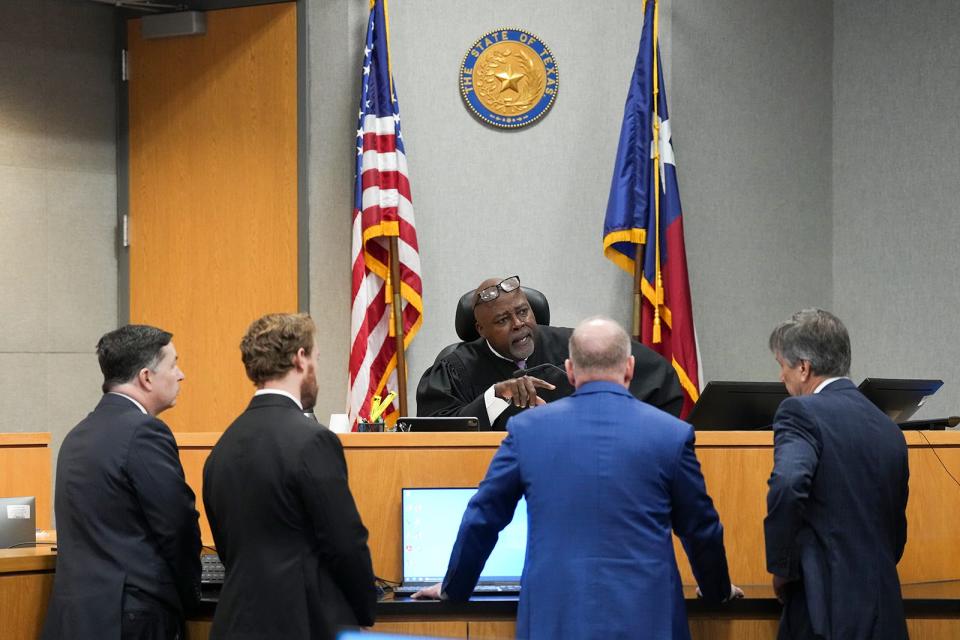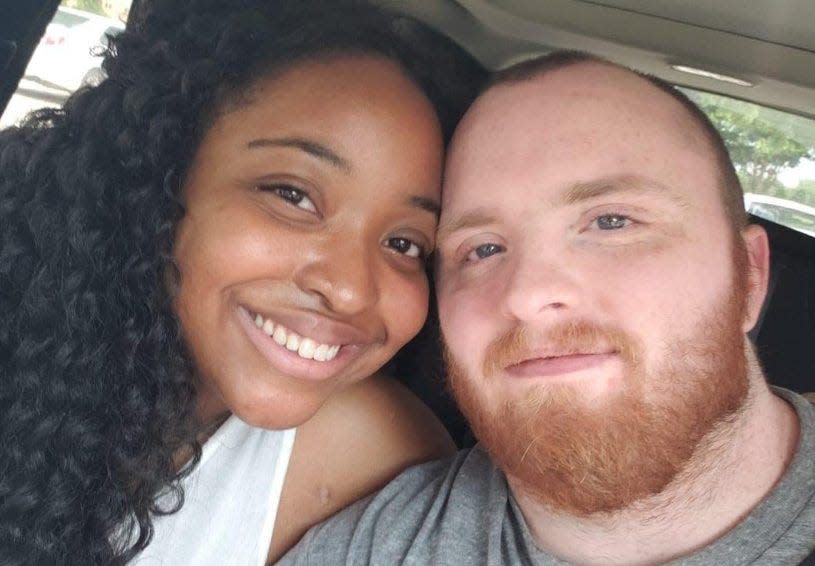Judge sentences Texas man who fatally shot Black Lives Matter protester to 25 years
- Oops!Something went wrong.Please try again later.
An Army sergeant plans to appeal after a Texas judge sentenced him to 25 years in prison in connection to the fatal shooting of a Black Lives Matter protester in 2020.
Daniel Perry, 36, was working as an Uber driver in Austin when he ran a red light and turned into a Black Lives Matter march on July 25, 2020. He told police that Garrett Foster, a 28-year-old Air Force veteran, approached his car with a raised AK-47, so he shot Foster, 28, five times with a handgun and then drove away.
One day after a jury found Perry guilty of murder in April, Gov. Greg Abbott vowed to pardon Perry. District Judge Clifford Brown did not address the potential pardon directly during sentencing, but he said Perry had a “fair and impartial trial” and the jury’s decision “deserves our honor and it deserves to be respected.”
Foster’s mother also addressed the court after sentencing.
“After three long years we’re finally getting justice for Garrett,” Sheila Foster said.
“Mr. Perry, I pray to God that one day, he will get rid of all this hate that is in your heart,” she said.

Board to consider pardon for Perry
Abbott faced calls from national conservative figures to act to urgently undo the conviction.
Abbott announced on Twitter on April 8 he would pardon Perry as soon as a request "hits my desk."
“Texas has one of the strongest ‘Stand your ground’ laws of self-defense that cannot be nullified by a jury or progressive district attorney,” Abbott said in a statement. “I will work as swiftly as Texas law allows regarding the pardon of Sgt. Perry.”
But Abbott cannot pardon Perry unless he receives a request from the Board of Pardons and Paroles to do so. The board, a seven-member panel appointed by Abbott, is considering Perry's case.
Perry will appeal and plans to “fully cooperate in the Texas pardon process,” attorney Clinton Broden said in a statement issued after the sentencing Wednesday. Broden called Perry’s conviction the product of “political prosecution.”
Travis County District Attorney Jose Garza said it was Abbott “who decided to insert politics in this case.” Garza said he’s contacted the board and has been assured that prosecutors will be allowed to present a case against a pardon, including a presentation from Foster’s family.

Pardon for Perry would be unusual, experts say
The potential pardon being considered for Perry is unique for a number of reasons.
Pardons are typically reserved for people who committed nonviolent crimes or those who committed crimes for reasons that were not entirely their fault. Scott Henson, a former political strategist and now a researcher and writer on the Texas criminal justice system, said he could find no precedent of a governor pardoning someone convicted of murder or moving to pardon someone who had yet to be sentenced since the two nonconsecutive terms of former Gov. Miriam "Ma" Ferguson in the 1920s.
Billy Humphrey, a Sam Houston State University adjunct professor of criminal justice who served as a senior warden in the Texas Department of Criminal Justice, said he is not aware of a governor acting so quickly to signal support for issuing a pardon, much less appearing to follow the lead of a TV commentator. He said politics should play no role in decisions related to pardons and clemency.
"I've never seen that before," said Humphrey, who served as a parole commissioner from 2009 to 2011. "If he wants to pardon somebody, certainly he's got the ability to do it. But to me, that's just divisive politics."
Prosecutors asked for 25 years, defense asked for 10
A prosecutor asked the judge on Tuesday to sentence Perry to at least 25 years in prison saying he was a "loaded gun" who could harm other people. Prosecutors argued Perry instigated the incident by running a red light at an intersection where he could clearly see the marchers before he drove into them.
Prosecutors also entered into evidence dozens of texts and social media posts Perry wrote, shared or liked, including racist images, that had been excluded from the trial. Days after protests erupted in the wake of the murder of George Floyd, Perry told an acquaintance, “I might go to Dallas to shoot looters.”
Perry’s attorney acknowledged some of his client’s posts were “repugnant” but argued they were presented out of context and that Perry has a right to free speech. Perry’s defense lawyers asked the judge to sentence Perry to 10 years, saying he was a veteran with no criminal history.
Contributing: The Associated Press; John C. Moritz, the Austin American-Statesman.
This article originally appeared on Austin American-Statesman: Daniel Perry sentence: 25 years after conviction in fatal shooting

